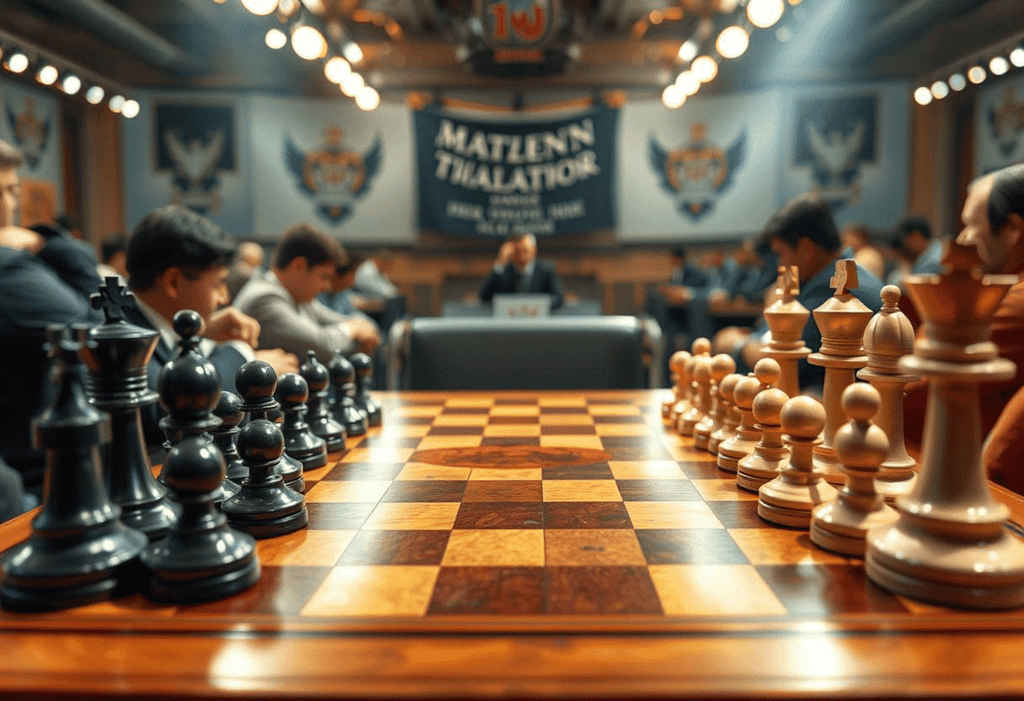The Ultimate Guide to Chess Tournaments: Unveiling the Diverse World of Competitive Chess | Chess Tutorial Course: Beginner to Advanced - Class 6 PDF Download
Introduction
Chess is a timeless game that has captured people's attention for ages. Over time, it has grown into a complex sport with various tournament formats. Whether you're passionate about chess or just starting to explore the exciting realm of chess competitions, this detailed guide will familiarize you with the main types of chess tournaments, which will be discussed later in depth. Chess Tournaments
Chess Tournaments
Each tournament format, ranging from knockout to round-robin, provides a distinct playing experience. Let's delve into the world of chess tournaments and uncover the intriguing variety they offer.
Knockout Chess Tournaments: Exciting Elimination Battles
Knockout tournaments are a favored format in chess competitions, whether conducted online or offline. Here’s a breakdown of how they function:
- Player Grouping: Participants are divided into various sections or groups.
- Advancement: The winners from each group progress to the subsequent round.
- Inter-Group Matches: In each round, players face off against winners from different groups.
- Winning Requirement: To succeed in a knockout chess tournament, a player must win all their games.
Second Chance Tournaments: A Shot at Redemption
Second chance tournaments are gaining popularity in online chess. They operate on the knockout format, providing players with another opportunity to compete:
- Redemption Opportunity: This format offers players a second chance if they get eliminated, akin to re-buy tournaments in poker.
- Strategic Element: The inclusion of a second chance adds a layer of redemption and strategic thinking to the event.
Round Robin Chess Tournaments: An Inclusive Format
- Round robin chess tournaments provide a more inclusive and strategic way of playing compared to the knockout format.
- In a round robin, every player competes against all other players in their group or section.
- Points are awarded for wins and draws, while players who lose do not earn any points.
- At the end of the rounds, players with the highest scores advance to the next round, and this process is repeated.
- It's important to note that Swiss tournaments are used to pair players based on their scores, rather than being a different format like round robin.
Swiss Chess Tournaments: Balancing Skill and Fair Play
- Swiss chess tournaments are renowned in the world of over-the-board competitions.
- These tournaments employ a system that pairs players based on their skills and experience.
- The Swiss format matches competitors with similar abilities, promoting fair play and equality.
- This format is commonly used in various individual tournaments.
 D. Gukesh, World Chess Championship winner, 2024
D. Gukesh, World Chess Championship winner, 2024
Different Types of Chess Tournaments: Connecting Various Locations
- Chess tournaments come in various types, each with its own unique charm, setting them apart from tournaments in other sports.
- These events are organized in different physical locations, spanning across multiple cities or regions.
- By simultaneously hosting a tournament in several locations, they foster a sense of unity and widespread participation.
- Players compete against opponents from different areas, emphasizing the global nature of chess.
Heads Up Chess Tournaments: The Pinnacle of Intense Battles
- Heads up chess tournaments feature only two exceptionally skilled players.
- These matches often capture the thrill and prestige associated with championship finals.
- Invited specifically for heads up play, these chess experts engage in highly strategic contests.
- World championship challenges serve as prime examples of heads up chess matches, showcasing remarkable skill and tactical brilliance.
- Additionally, local tournaments play a crucial role in nurturing chess talent in various regions.
Understanding Chess Tournament Terminology: A Guide to Chess Events
For newcomers to chess tournaments, the specific terminology can initially seem overwhelming. However, most tournaments clearly specify their formats, making it easier for players to find suitable options. As players gain experience, they often develop a preference for certain tournament styles, becoming more engaged in the thrilling world of competitive chess.
Conclusion
- Chess tournaments offer a range of exciting experiences and strategic challenges.
- Formats such as the high-stakes Swiss system and the balanced round-robin tournaments each present unique challenges and advantages.
- A round-robin tournament allows every participant to compete against all others, providing multiple opportunities to play.
- Whether you are an experienced player or a beginner, exploring the various chess tournament formats enhances your understanding and appreciation of this timeless game.
- Therefore, embrace the terminology and enjoy the unfolding chess tournaments!
|
45 videos|14 docs|5 tests
|
FAQs on The Ultimate Guide to Chess Tournaments: Unveiling the Diverse World of Competitive Chess - Chess Tutorial Course: Beginner to Advanced - Class 6
| 1. What are the main differences between knockout chess tournaments and round robin chess tournaments? |  |
| 2. How do second chance tournaments work in chess? |  |
| 3. What is a Swiss chess tournament and how does it maintain fairness among players? |  |
| 4. What are heads up chess tournaments and what makes them unique? |  |
| 5. What terminology should I know when participating in chess tournaments? |  |






















